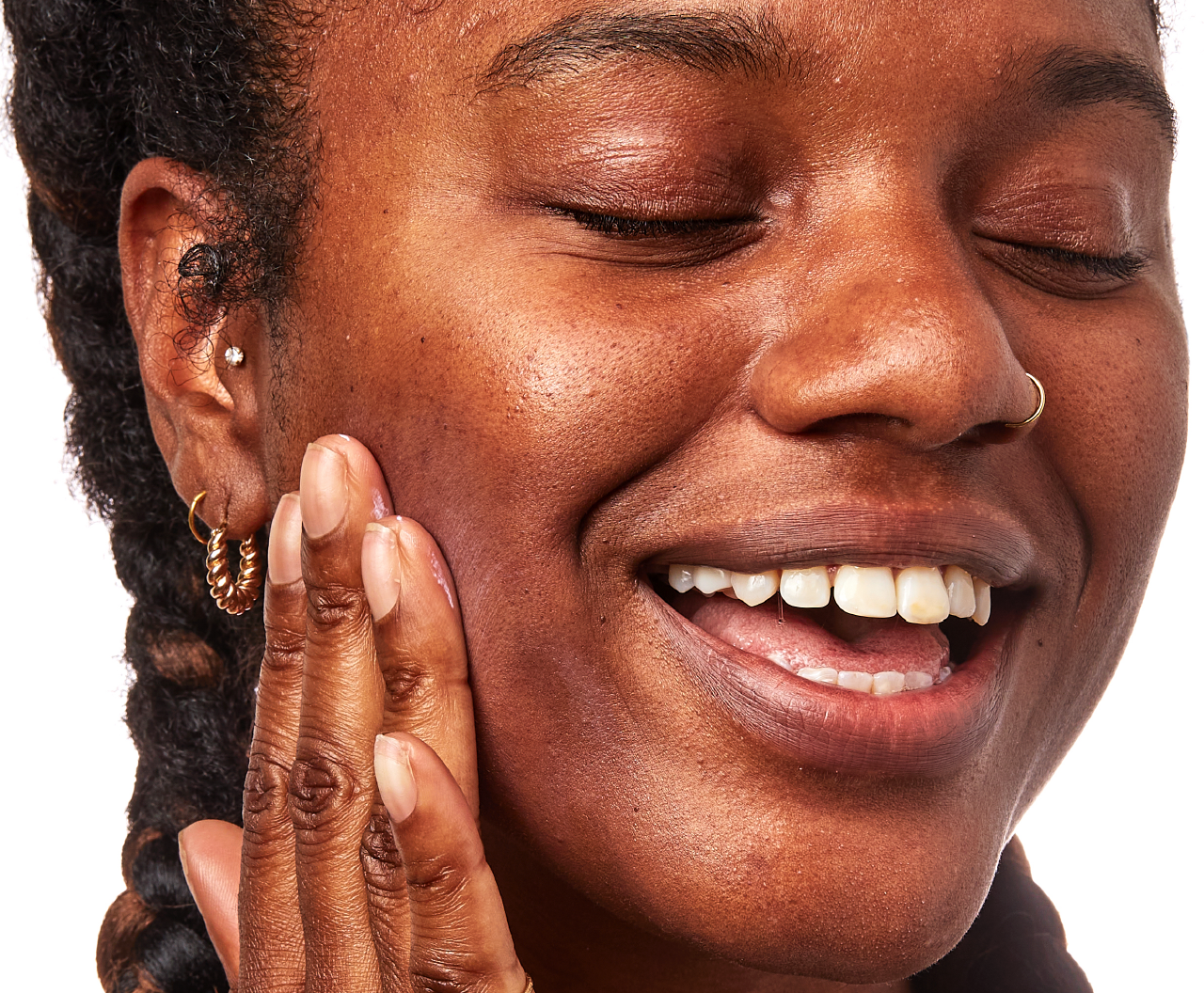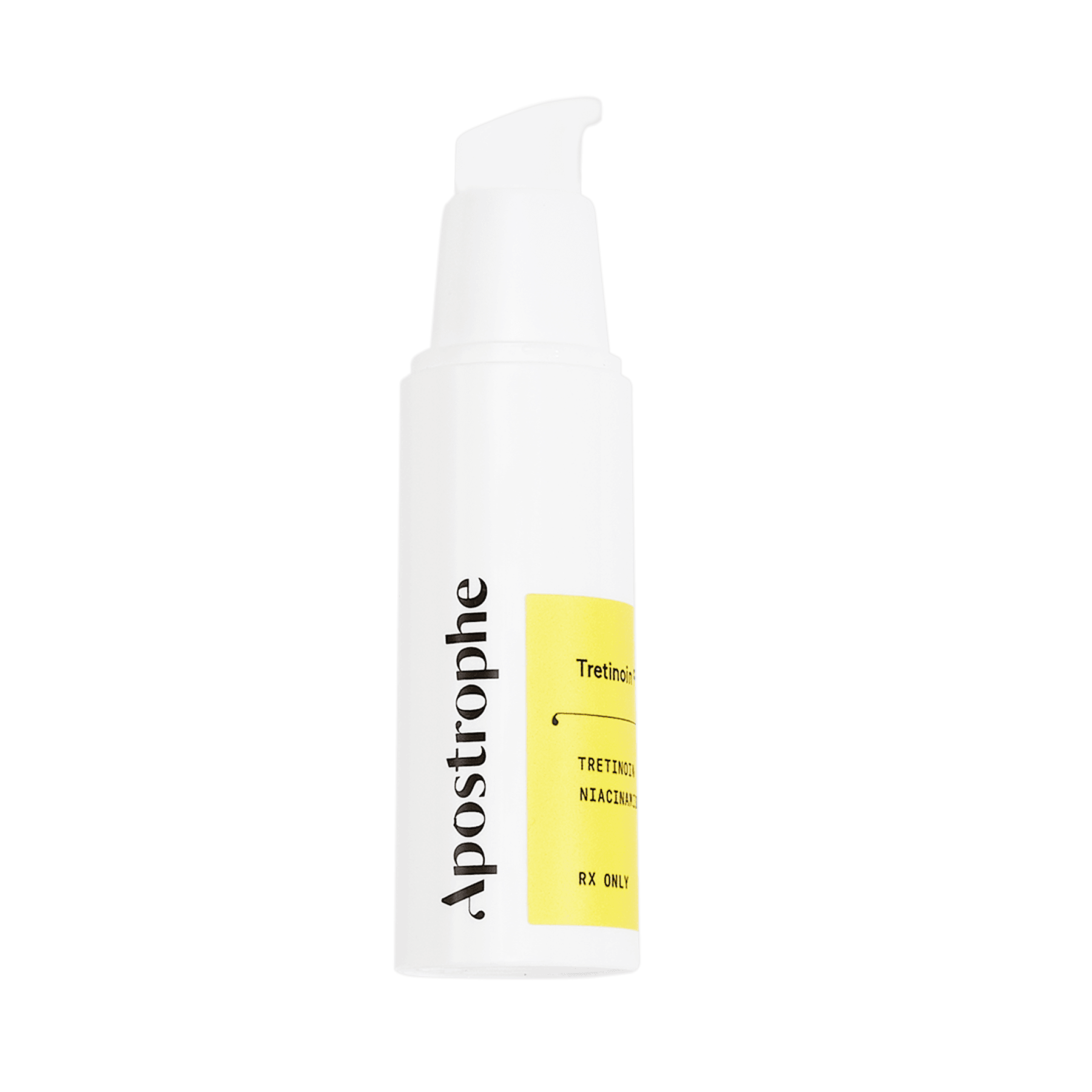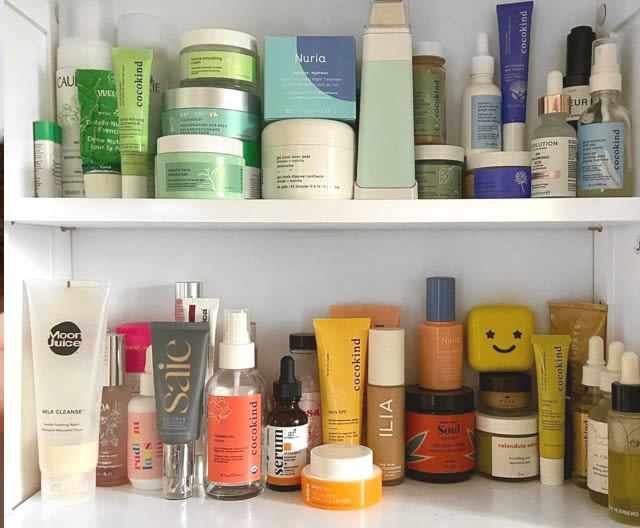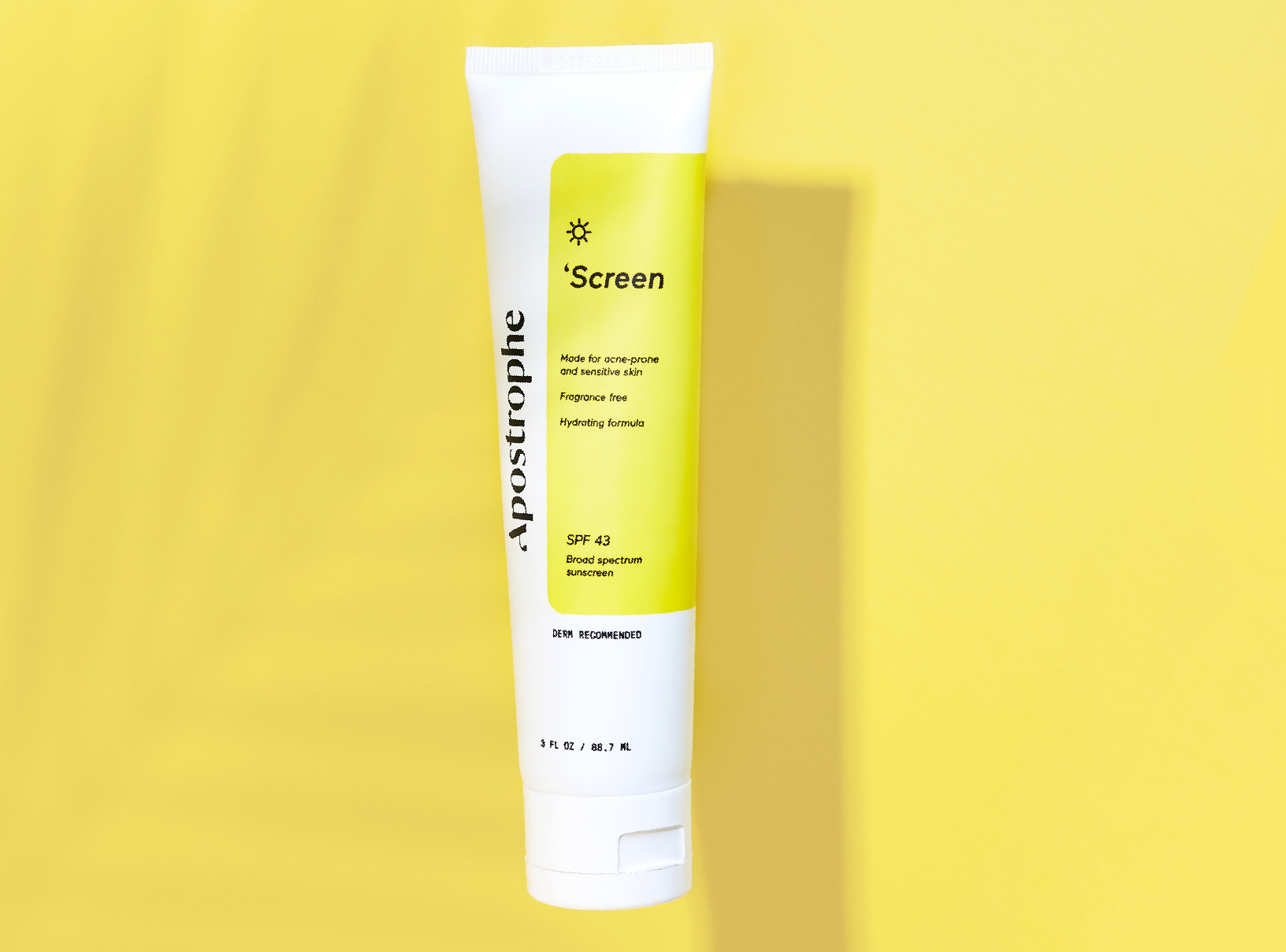General
How to get better skin


SHARE
General
How to get better skin
Medically reviewed by Mary Lucas, RN
Written by Apostrophe Team
Last updated 3/1/2023
Gorgeous, glowy skin that looks youthful and healthy? Yes, please!
Of course, getting that kind of complexion can be easier said than done. Everything from hormonal fluctuations to lifestyle habits (happy hour, we’re looking at you) can affect how your skin looks.
Luckily, there are a number of things you can do to get better skin. Below are some tips and pointers that can get you closer to your goals.
Cleanse Correctly
Allowing gunk to build up on your face is no way to keep your skin healthy. Ideally, you want to wash your face twice a day (morning and night) — plus, anytime you work up a sweat. Oh, and skip the hot water and instead go with lukewarm water.
What you wash with matters, too. Be selective about what you choose to wash your face with — and, no, that bar soap in the corner of your shower probably won’t do. Research suggests that specially formulated cleansers may reduce acne and promote all-around skin health.
So, what makes up a high-quality face wash? You want something gentle and non-abrasive, and without any drying alcohol. Non-comedogenic is also a good word to look for on the label: It’s a fancy word that means the product is less likely to clog your pores.
Want to learn more about how to get dewy skin? You can read our full guide to washing your face, here.
Use a Moisturizer Regularly
Moisturizers serve a variety of purposes. They hydrate skin, keep it smooth, and can also boost your skin’s function as a barrier, which protects your face more effectively from environmental factors.
Sebaceous glands under your skin actually help keep your skin lubricated on their own; these glands release oil that then nourishes your skin. However, this natural oil can be worn away by things like the sun, pollution, and more.
A hydrating face cream will add moisture back and give you radiant skin — and you should be using one, no matter your skin type.
Even if you have oily skin, you will still want to use a moisturizer or hydrating face cream. Skipping a moisturizer because you have oily skin could actually increase oil production. That’s because if your skin gets even a little dry, it tells your body to produce more oil, making the problem worse. Opt for a gentle moisturizer that works well for your skin type.
As for the ideal time to apply moisturizer? Right after you shower or wash your face. It can help ‘lock’ dewy moisture into your skin.
Don’t Skimp on Sunscreen
You likely know that baking in the sun without sunscreen can lead to skin cancer. But did you know it can also induce wrinkles and cause skin damage?
There is research that has uncovered that UV exposure can reduce elastic properties in the skin. When that elasticity is reduced, your face may begin to sag and wrinkles may form.
Of course, there are many facial sunscreens on the market. Not sure what to use? A broad-spectrum water-resistant formula with a minimum of SPF 30 is recommended. The term “broad-spectrum” simply means that the sunscreen protects against the two types of sun rays that can harm the skin (also known as UVA and UVB). If you’ve been looking for an acne-safe sunscreen, shop ‘Screen!
Take Care of the Skin around Your Eyes
If the skin around your eyes is of particular concern, enlist the help of an eye cream. There’s even some research to back up claims they may work.
One clinical trial looked at eye cream usage over four weeks and found it improved the appearance of wrinkles in that area.
As for what ingredients to look for to solve under eye issues, vitamin C may help — it’s been suggested that it can reduce physical signs of aging.
Skin products that contain caffeine and vitamin K may also be worth your while. A study found these ingredients can improve under eye circles.
Another tip: The eye area can have more sensitive skin, so you should look for hypoallergenic formulas, which are less likely to cause reactions. You can also test a small amount of cream in the area before going all in on it, just to ensure your skin reacts well to it.
Nip Acne in the Bud
Bumps, pustules, and red spots can be unsightly and a confidence killer. So, if you have acne, you’ll want to consider products that can help you deal with it.
If you have mild acne, you can likely go with something over-the-counter. Look for acne treatments that contain benzoyl peroxide or salicylic acid to deal with your pimples. There are both all-over and spot treatments for acne.
Have a more severe case of acne? You may want a prescription-strength treatment. Tretinoin and clindamycin are ingredients that may help. You can get your own customized prescription treatment through Apostrophe.
Make Lifestyle Tweaks
Products will go a long way toward helping you get better skin, but certain lifestyle adjustments can also impact your skin in a positive way. Here are some lifestyle tweaks you’ll want to make:
Drink Plenty of Water: Dehydration can make you feel icky, but it can also affect the way your skin appears. Specifically, dry skin can look older.
Watch Your Alcohol: Now that you know dehydration can age your skin, you should know that alcohol can dehydrate you. Limiting alcohol intake can help prevent thirsty skin and keep your skin looking youthful.
Say No to Cigarettes: There are a variety of reasons you shouldn’t smoke — namely, it puts you at risk for cancer and heart disease. Also true: Individuals who smoke may have more wrinkles.
Eat Well: Yet another reason to eat more veggies and fruit. Research shows that incorporating these healthy foods into your eating regimen could reduce premature skin aging.
Exercise on the Regular: There are studies that suggest working out on a regular basis may boost circulation and improve your immunity. As a result, your skin may appear more youthful.
Sleep Well: When you are well-rested, your whole face shows it. That’s because sleep plays a role in immune function, which affects collagen production. Your skin needs collagen to stay plump. So, if you’re not getting your beauty sleep, it can impact your complexion.
Better Skin Is All Yours
If you’re wanting healthy skin that looks great, changing up your approach to your skin care routine can help.
Making sure you are cleansing and moisturizing to prevent dry skin is a must. Then, you can address specific concerns — like acne or under eye circles or wrinkles.
Lifestyle adjustments can also improve your look and help you get better skin. Drinking water, sticking to a healthy diet, and working out can go a long way.
If you’re looking to get healthier skin, you can start a virtual consultation through Apostrophe. Apostrophe can help you get connected with an expert derm team who will create a treatment plan that tackles your skin concerns.
17 Sources
Face Washing 101. American Academy of Dermatology. https://www.aad.org/public/everyday-care/skin-care-basics/care/face-washing-101
Isoda, K., Seki, T., Inoue, S., et al. (2015, February). Efficacy of the combined use of a facial cleanser and moisturizers for the care of mild acne patients with sensitive skin. J Dermatol, 42(2):181-8. https://pubmed.ncbi.nlm.nih.gov/25483138/
Kaul, N., Kohoot, E., (2007). Skin Moisturizers: Therapeutic potential and preventative maintenance of dry skin. Journal of the American Academy of Dermatology. Retrieved from https://www.jaad.org/article/S0190-9622(07)01815-4/fulltext
Picardo, M., Ottaviani, M, et al. (2009, Mar-April). Sebaceous gland lipids. Dermato Endocrinology, 1(2): 68–71. https://www.ncbi.nlm.nih.gov/pmc/articles/PMC2835893/
Moisturizer: Why You May Need It If You Have Acne. American Academy of Dermatology. https://www.aad.org/public/diseases/acne/skin-care/moisturizer
Dermatologists’ Top Tips For Relieving Dry Skin. American Academy of Dermatology. Retrieved from https://www.aad.org/public/everyday-care/skin-care-basics/dry/dermatologists-tips-relieve-dry-skin
Imokawa, G. (2009). Mechanism of UVB-Induced Wrinkling of the Skin: Paracrine Cytokine Linkage between Keratinocytes and Fibroblasts Leading to the Stimulation of Elastase. Journal of Investigative Dermatology Symposium Proceedings, P36-42. Retrieved from https://www.jidsponline.org/article/S1087-0024(15)30508-6/fulltext
Sunscreen FAQs. American Academy of Dermatology Association. Retrieved from https://www.aad.org/public/everyday-care/sun-protection/sunscreen-patients/sunscreen-faqs
Kaczvinksy, J., Griffiths, C., Schnicker, M., Li, J., (2009, September).Efficacy of anti-aging products for periorbital wrinkles as measured by 3-D imaging. J Cosmet Dermatol, 8(3):228-33. https://pubmed.ncbi.nlm.nih.gov/19735523/
Pullar, J., Carr, A., Vissers, M., (2017, August). The Roles of Vitamin C in Skin Health. Nutrients, 9(8): 866. https://www.ncbi.nlm.nih.gov/pmc/articles/PMC5579659/
Ahmadraji, F., Shatalebi, M., (2015). Evaluation of the clinical efficacy and safety of an eye counter pad containing caffeine and vitamin K in emulsified Emu oil base. Advanced Biomedical Research. https://www.ncbi.nlm.nih.gov/pmc/articles/PMC4300604/
How to Maximize Results From Anti-Aging Products. American Academy of Dermatology. Retrieved from https://www.aad.org/public/everyday-care/skin-care-secrets/anti-aging/maximize-anti-aging-products
Acne: Diagnosis and Treatment. American Academy of Dermatology. https://www.aad.org/public/diseases/acne/derm-treat/treat
11 Ways to Reduce Premature Aging. American Academy of Dermatology Association. Retrieved from https://www.aad.org/public/everyday-care/skin-care-secrets/anti-aging/reduce-premature-aging-skin
Morita, A., Torii, K., Maeda, A., Yamaguchi, Y., (2009). Molecular Basis of Tobacco Smoke-Induced Premature Skin Aging. Journal of Investigative Dermatology Symposium Proceedings, P53-55. Retrieved from https://www.jidsponline.org/article/S1087-0024(15)30511-6/fulltext
Schagen, S., Zampeli, V., Makrantonaki, E., Zouboulis, C., (2012, July). Discovering the link between nutrition and skin aging. Dermato Endocrinology, 4(3): 298–307. Retrieved from https://www.ncbi.nlm.nih.gov/pmc/articles/PMC3583891/
Kahan, V., Andersen, M., Tomimori, J., Tufik, S., (2010). Can poor sleep affect skin integrity? Med Hypotheses. Retrieved from https://pubmed.ncbi.nlm.nih.gov/20678867/
Shop this post

Tretinoin
Like what you just read? Sign up for our email list to get the scoop on skincare science delivered straight to your inbox.

General
What is milia?
What is milia? Today, we’re jumping into one type of bump that you may have heard about most commonly in infants — milia.
Read More
General
Best moisturizer for acne-prone skin
If you have combination acne-prone skin, figuring out which moisturizer is best for your skin might be tough. In this guide, we break down the best moisturizer for combination, acne-prone skin.
Read More
General
How to build a face care routine
As you get into skincare, it might seem overwhelming, especially trying to figure out the order you're supposed to apply products in. Below, we detail how to build a face care routine for your skin!
Read More
